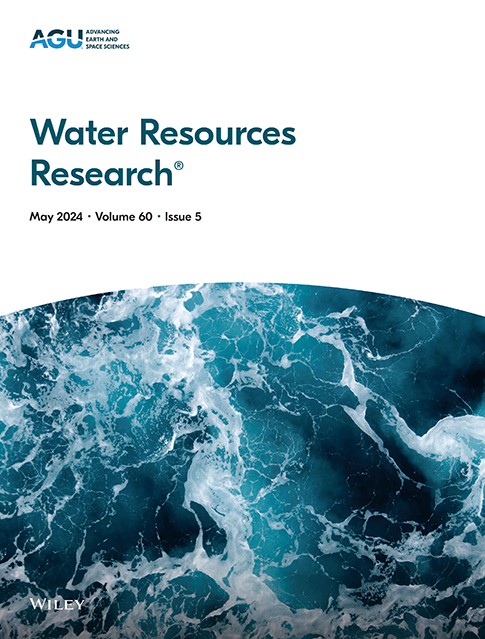通过物理约束神经网络从土壤湿度数据中学习构造关系
IF 4.6
1区 地球科学
Q2 ENVIRONMENTAL SCIENCES
引用次数: 0
摘要
理查德森-理查德方程的构成关系体现了土壤保水性和导电性的宏观特性。这些土壤水力函数通常由具有少量参数的模型来表示。这种土壤水力模型的自由度有限,限制了我们通过逆建模从土壤水分数据中提取土壤水力特性的能力。我们提出了一种新的自由形式方法,利用物理约束神经网络学习构成关系。我们在可微分建模框架 JAX 中实施了反建模框架,以确保可扩展性和可伸缩性。为了实现高效的梯度计算,我们通过 Richardson-Richards 方程的非线性求解器实现了隐式微分。我们针对合成噪声数据对该框架进行了测试,并证明了它在不同噪声幅度和神经网络自由度下的鲁棒性。我们将该框架应用于上渗实验中的土壤湿度数据,结果表明基于神经网络的方法比参数模型更适合实验数据,而且该框架可以学习构成关系。本文章由计算机程序翻译,如有差异,请以英文原文为准。
Learning Constitutive Relations From Soil Moisture Data via Physically Constrained Neural Networks
The constitutive relations of the Richardson-Richards equation encode the macroscopic properties of soil water retention and conductivity. These soil hydraulic functions are commonly represented by models with a handful of parameters. The limited degrees of freedom of such soil hydraulic models constrain our ability to extract soil hydraulic properties from soil moisture data via inverse modeling. We present a new free-form approach to learning the constitutive relations using physically constrained neural networks. We implemented the inverse modeling framework in a differentiable modeling framework, JAX, to ensure scalability and extensibility. For efficient gradient computations, we implemented implicit differentiation through a nonlinear solver for the Richardson-Richards equation. We tested the framework against synthetic noisy data and demonstrated its robustness against varying magnitudes of noise and degrees of freedom of the neural networks. We applied the framework to soil moisture data from an upward infiltration experiment and demonstrated that the neural network-based approach was better fitted to the experimental data than a parametric model and that the framework can learn the constitutive relations.
求助全文
通过发布文献求助,成功后即可免费获取论文全文。
去求助
来源期刊

Water Resources Research
环境科学-湖沼学
CiteScore
8.80
自引率
13.00%
发文量
599
审稿时长
3.5 months
期刊介绍:
Water Resources Research (WRR) is an interdisciplinary journal that focuses on hydrology and water resources. It publishes original research in the natural and social sciences of water. It emphasizes the role of water in the Earth system, including physical, chemical, biological, and ecological processes in water resources research and management, including social, policy, and public health implications. It encompasses observational, experimental, theoretical, analytical, numerical, and data-driven approaches that advance the science of water and its management. Submissions are evaluated for their novelty, accuracy, significance, and broader implications of the findings.
 求助内容:
求助内容: 应助结果提醒方式:
应助结果提醒方式:


